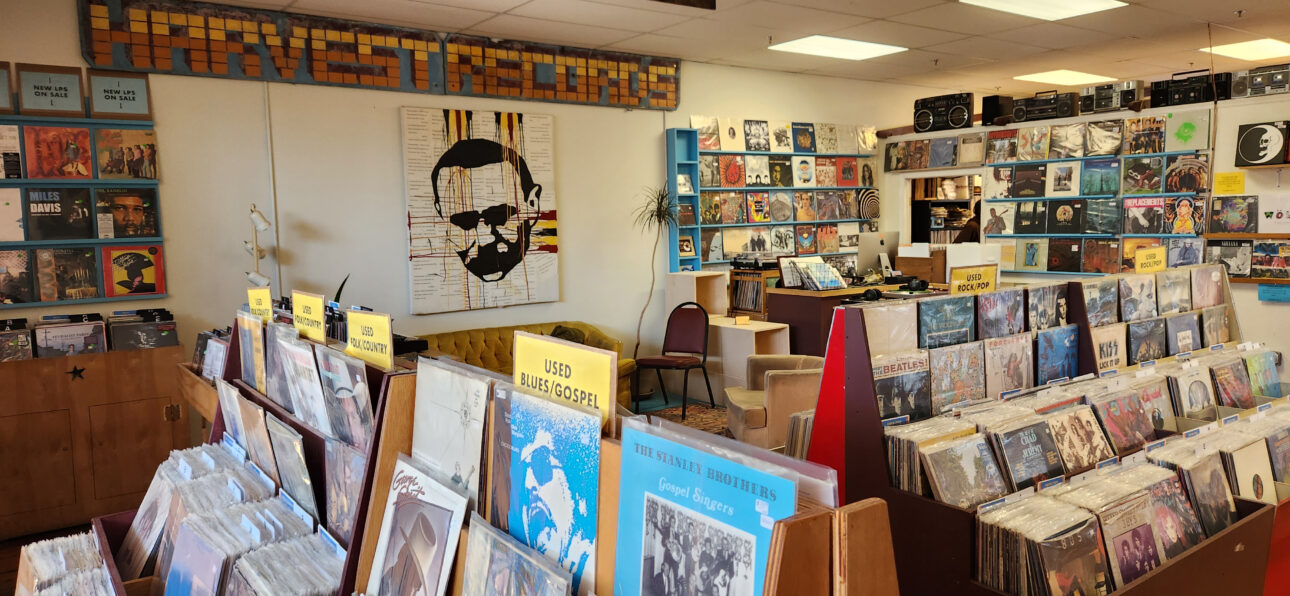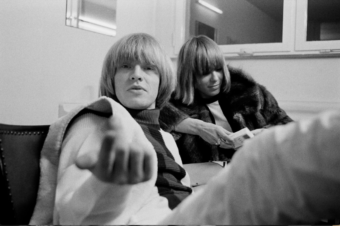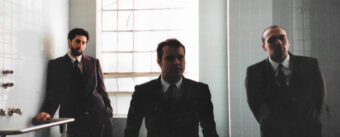In the early 2000s, Matt Schnable and Mark Capon were pals attending James Madison University in Virginia. They knew they wanted to launch a venture after finishing school, and they decided on a record shop. “But we were also hoping to create a space beyond just selling records,” Capon recalls. “In college, we were involved with promoting shows and with the college radio station community. And community appealed to us as much as retail.”

Also Read
SPIN First Drop: Will Clarke
Schnable concurs. “Going against some preconceived notions of record stores, we wanted to create a comfortable environment where people could hang out, meet up, exchange, be a part of something.” They decided on Asheville, North Carolina, a hip city of under 100,000 in the Blue Ridge Mountains. “A friend or two had mentioned that Asheville seemed cool, but neither of us had really been here,” says Capon.
At the time, West Asheville—a community across the French Broad River from downtown—was still a sleepy neighborhood, home to the odd vacuum cleaner repair shop or diner, but with no real scene. The two found a space, one they felt could fill a void left by the recent closing of Almost Blue, a beloved downtown record shop run by the brother of Allman Brothers Band guitarist Warren Haynes. “West Asheville is where we could open a neighborhood record store,” Schnable says.
Twenty years later, Harvest Records is an anchor of the now vibrant West Asheville community. Since its opening, the store has doubled in size and shifted its inventory (originally a mix of CDs and records) to focus primarily on vinyl. The store celebrates its major anniversaries in style: The 10-year mark brought with it the Harvest-organized Transfigurations Festival, an expertly curated event featuring an eclectic bill: Steve Gunn, Angel Olsen, the Clean, Lee Fields, Greg Cartwright’s Reigning Sound, and many others. Co-owners Capon and Schnable promise something different yet equally special for the store’s landmark 20th anniversary in August.

How do you find used records?
Matt Schnable: We’ve been around long enough so that we’re very lucky—records come in virtually every single day. It could be three records, could be 50 records, but they’re coming in all the time. But it took a long time for us to be established enough to get that walk-in traffic; it was not like that at first.
Mark Capon: They come through, but it’s never fully satisfying. You always want more. We never advertise much, but we have done some radio and print ads, some Craigslist, classifieds, and Yellow Pages over the years to let people know, “Hey, we buy records.”
Matt: And we still go out to people’s houses to look at collections.
Do people ever donate records?
Mark: Yeah, because they’re tired of lugging them around! What happens a lot when we buy collections is that we’ll break it down and say, “We can take these for this much, and we’ll pass on those.” And they say, “Do you just want them all? I don’t want to take them back out to the car.”
Matt: A customer came in a couple of months ago and told me, “I’m trimming fat off the collection. You guys have been great to me for the past 10 years, so I just want to donate these.” So every now and again we get these sweet customers who just want us to have them, sell them, and make some money.

What’s the most expensive record you’ve ever sold?
Matt: It might have been that Osey Helton 78. He was a fiddle player from around here. We just also sold a Derek and the Dominoes Layla mono promo, which is an exceedingly rare record. And that was over $1,000.
Mark: One of our most exciting moments was many years ago, probably 2009. We had the first Misfits seven-inch, “Cough/Cool.” It’s been bootlegged a lot. Our friend Greg Cartwright helps us a lot of the time; he’s big in the 45-collector world. He was going to a 45 show in Allentown, Pennsylvania. He took it along and sold it for $1,300; he came back and brought us the cash. We were all at a bar, and we bought a bunch of shots! At that point in our lives, I doubt we had even sniffed $1,000.
What was the rarest disc you’ve sold?
Mark: There was a Dolly Parton picture disc we sold for $1,000; we probably could have gotten more.
Matt: Yeah, we probably could have gotten two or three grand. It was something that only RCA executives got; they made five or 10 of them.
Who’s the most famous person who ever came into your store?
Mark: We’ve had a variety of actors and tons of musicians, but at least in our world, Brian Eno is the most famous, most legendary. He sat on that very couch [points]; we sat on either side of him, grabbed his knee. We had an hour with Eno in here; we were open, but no other customers came in.
Matt: I was like, “Oh, my God—Eno is here.” He was just walking around and shopping, checking things out. He took recommendations and bought a bunch. It was surreal; it was one of the best moments.

What was your first concert?
Mark: I’m so glad you asked that! I love bragging about this. I was 13. My first concert was Nirvana, the Breeders, and the band Come. This was in Jacksonville, Florida, where I grew up. It was November ‘93, and [Kurt Cobain] died in April of ‘94. I’m just barely old enough to have done that. If I was a year or two younger, it would have been too much.
Matt: The Cranberries. The opener was—who does “Shine”?—Collective Soul.
What’s your favorite album?
Matt: I listen to tons of Michael Hurley – Armchair Boogie, Velvet Underground and Nico.
Mark: The first record that I was fully obsessed with, that changed my life, was the first Pearl Jam, Ten. It set me on a grunge path, like a lot of kids my age. The next album I can remember fully re-tweaking my brain was a Palace [Music] album: Will Oldham, before he was Bonnie Prince Billy. Viva Last Blues.
What advice would you give to someone who wants to open a record store?
Mark: I can think of a few things. One would be to [looks at Matt] get a good business partner. [Matt winks.] You can do it yourself, but I imagine it would be tough. Do right by your people. Listen to your customers and your staff. With any business you could probably fall into a curmudgeonly “I know how to do this” attitude. You can’t do that, especially when selling music. So listen.
Matt: Keep an open mind. Have the ability to be influenced by your customers. Evolve naturally with the community. Trying to grow exponentially when your town—or you—can’t handle it is a terrible idea. And start small, but with as stacked an inventory as you can manage.
Mark: Keep it interesting for your customers. Every time someone comes in, they should be able to see new things. Rearrange things, but also get new titles in. We’ve all had those experiences where you go into the dusty record store, and it’s the same prices on the same shit that’s been there since the last time you were there a year ago. I think our customers really feel like, “Every time I’m in here, there’s something new happening.”
Matt: You go into some record stores, and they’re highly specialized and that’s what they carry. And that’s cool. But if you are going to run a record store for the masses, stock as much as you can, have diverse genres, and have a wide range of prices. Have those $3.00 and $5.00 records so you’re not pricing people out. We want everyone to be able to walk in here and find something, whether it’s a $2.00 record or a box set or a rare record; all the customers are important.




